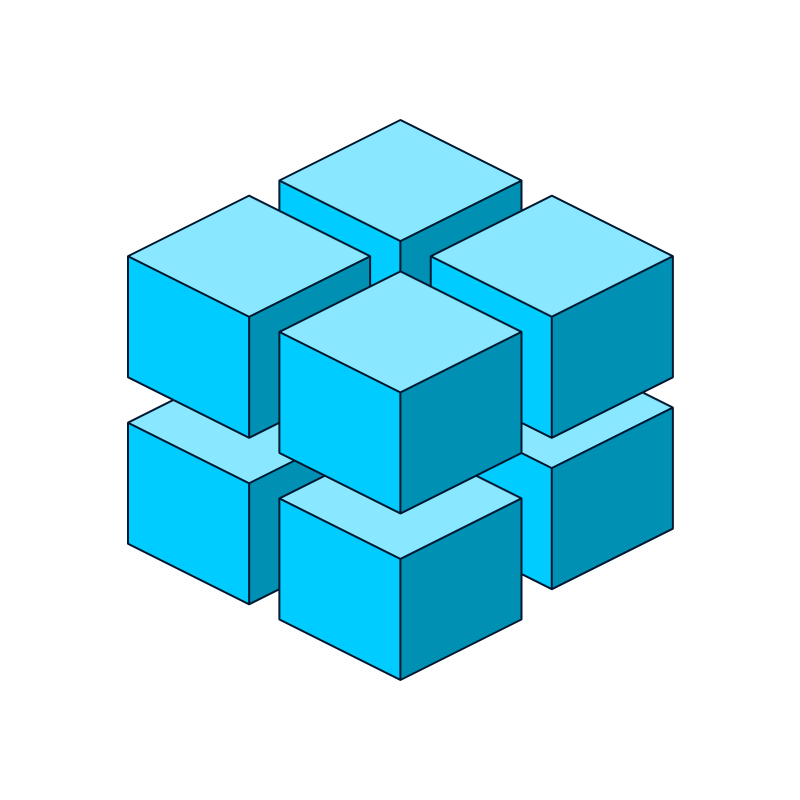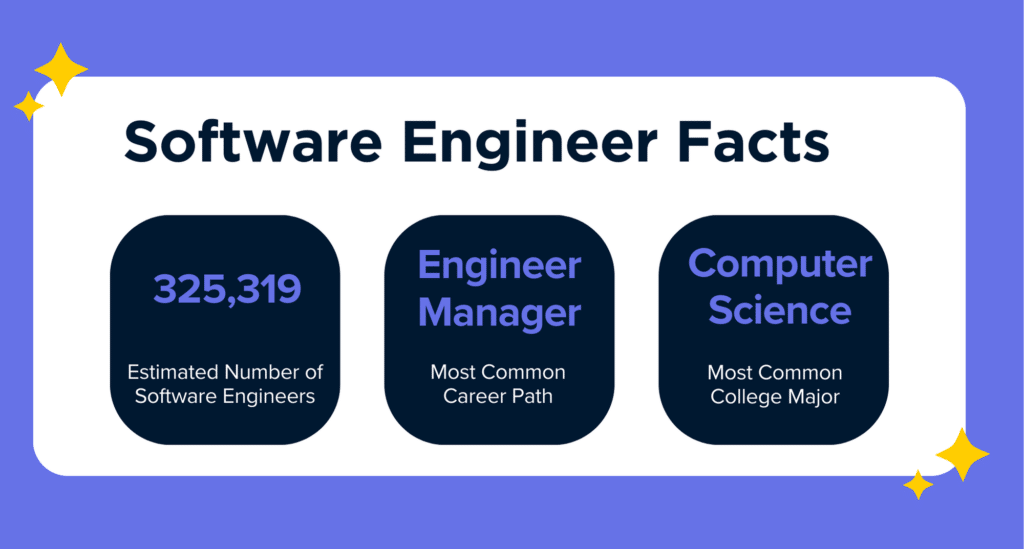Software engineers are the architects of digital infrastructure, creating and maintaining systems to meet and exceed user needs and industry standards. They integrate innovation with functionality, crafting robust solutions for many technological challenges.
Being a great software engineer goes beyond just writing clean code. It involves analytical thinking, problem-solving, continuous learning, and adapting to new technologies and methodologies.
Keep reading to explore a successful software engineer’s essential skills and daily responsibilities. Plus, read about our career journeys in joining the KORTX software team.
⚡ Insights into software engineer careers ⚡
- Around 22% of software engineers are women, while around 78% are men.
- 72% of software engineers have a bachelor’s degree.
- There are over 325,319 software engineers employed in the United States.
Source: Zippia.com
What Are the Top Hard & Soft Skills Required for a Software Engineer?
Zippia, a career guidance website, ranked the top skills for software engineers based on how often specific skills appeared on resumes. Below is a list of the skills Zippia recommends, along with what we believe to be the best skills a software engineer needs to have.
#1 A Programming Language
All potential software engineers must learn a programming language.
Java is the most common language, with 14.8% of software engineers listing it on their resumes. Python is a close second, appearing on 8.6% of resumes.
Choosing a language depends on the type of software engineering you want to pursue.
- Web development: JavaScript, HTML, and CSS are fundamental. You might look into Ruby, Python, or PHP for more dynamic, server-side applications. For more complex applications, look into a JavaScript meta framework such as React, Svelte, or Vue.
- Mobile development: Swift or Objective-C (for iOS), and Kotlin or Java (for Android). For cross-platform mobile development, frameworks like Flutter, Xamarin, and React Native can also be used.
- Game development: C++ and C# are popular in the gaming industry, especially with engines like Unity and Unreal. Godot is a common engine to use.
- Data science/machine learning: Python and powerful libraries like NumPy, Pandas, and TensorFlow.
- Systems/embedded development: C, C++, and Rust are widely used.
- Enterprise applications: Java and C#.
Once you know a programming language, you can use your skill set in many ways, including:
- Application development: Creating various applications, from simple desktop programs to complex, scalable enterprise software.
- Data science and analysis mastery: Writing scripts to analyze data sets, create predictive models, and visualize data using languages popular in data science, such as Python and R.
- DevOps and process automation: Automating and integrating the processes between software development and IT teams to build, test, and release software faster and more reliably.
Resources to learn a programming language skill:
- Online schools: Coursera, Udemy, Codeacademy.
- Podcasts: CodeNewbie, Syntax, Software Engineering Daily.
💡 Our Pro-Tip: Find what interests you the most about software engineering and learn the languages and tools relevant to that area. Whether it’s creating interactive websites, developing mobile applications, analyzing data, or building game engines, focusing on what you enjoy will make the learning process more engaging and help you develop a specialized skill set that can set you apart in the job market.
#2 The Software Development Life Cycle (SDLC)
The Software Development Life Cycle (SDLC) is an international standard developers use to stay consistent, maintain quality, and deliver high-quality software on time.
In day-to-day operations, engineers use the SDLC in various ways for:
- Collaboration: Collaborate with stakeholders to document and identify functional requirements throughout the software development stages.
- Software development best practices: Advocate and implement best practices in the software development process, like test-driven development and continuous integration.
- Quality assurance leadership: Oversee and enhance quality assurance processes, using project insights to improve efficiency and collaboration.
- Client-focused analysis & contribution: Analyze and contribute to client requirements across all stages of the software development process.
- Specialized software development contributions: Contribute to specialized software development projects, utilizing pattern recognition and image processing expertise.
Resources to learn about the SDLC:
- Courses: Software Development Lifecycle Specialization, Software Development Lifecycle LinkedInLearning.
- Blog posts: What Is SDLC? Understand the Software Development Life Cycle, Software Development Life Cycle (SDLC).
- Podcasts: Coders Campus: The Software Development Life Cycle, Simplifying DevOps: The Software Development Lifecycle
⚡ Tip: Although following the SDLC helps with consistency and quality, be open to project changes, team dynamics, and evolving technologies. Always tailor the SDLC to fit your project’s needs.
#3 Communication & Interpersonal Skills
Engineering isn’t a solitary career; it requires collaboration, understanding, and sharing complex ideas in simpler terms across teams.
Here are the reasons why communication and interpersonal skills are vital for engineers:
- Teamwork: Engineering projects often involve teams with diverse skills. Effective communication helps coordinate tasks, share insights, and brainstorm solutions.
- Idea exchange: Engineers frequently need to discuss problems, propose solutions, and gather feedback. Clear communication ensures that ideas are understood and considered.
- Progress reporting: Communicating progress, setbacks, and changes helps projects stay on track and stakeholders are informed.
- Mentorship: More experienced engineers often mentor juniors. Good communication skills help engineers teach and guide others effectively.
- Negotiation: When disagreements arise, especially about project directions or resource allocation, engineers with strong interpersonal skills can negotiate and find a middle ground.
While technical skills are important to becoming an engineer, communication and interpersonal skills connect every part of the project, team, and broader professional community.
Resources to learn communication skills:
- Courses: Successful Negotiation: Essential Strategies and Skills, Effective Communication: Writing, Design, and Presentation Specialization, Negotiation Skills.
- Books: How to Win Friends and Influence People in the Digital Age, The Challenger Sale.
- Podcasts: The Client Whisperer, The Customer Experience Podcast.
💡 Our Pro-Tip: Engage in active listening. Active listening involves fully concentrating, understanding, responding, and remembering what is being said. This helps build a rapport with your team members, creating a more harmonious and productive workplace.
What is your biggest tip for becoming a software engineer?
“My biggest tip for anyone entering the field is to embrace a mindset of continuous learning. The tech landscape is dynamic and always evolving. It is important to stay curious, ask questions, be eager to learn, and welcome new challenges.”
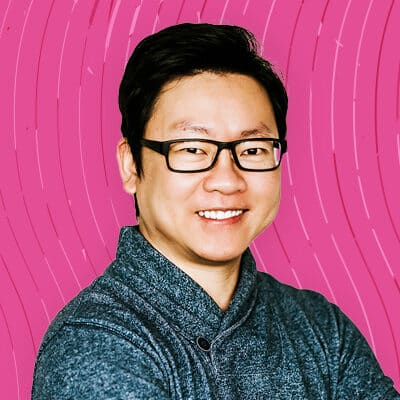
#4 Intellectual Boldness
Engineers must have the confidence and drive to learn and tackle problems constantly.
Intellectual boldness means embracing challenges with a proactive mindset, seeking out new knowledge, and being prepared to pivot or innovate when traditional methods don’t suffice.
- Innovation through complexity: Seek out complex problems as opportunities for innovation and growth.
- Unconventional problem solving: Challenge the status quo and seek unconventional solutions.
- Continuous learning commitment: Continually update their knowledge base with the latest advancements in their field.
- Strategic risk-taking: Make informed, risk-involving decisions with the potential for significant rewards.
- Adaptive strategy implementation: Adapt their approach flexibly based on new information or evolving circumstances.
- Collaborative insight generation: Collaborate with diverse individuals for broader insights and innovative problem-solving.
- Cultivating critical thinking: Encourage an environment of questioning and constructive criticism in the creative process.
- Resilience and growth mindset: View setbacks as essential learning steps in discovering and improving.
- Leadership and inspiration: Mentor and inspire others, fostering a culture of bold thinking within their team or organization.
💡 Our Pro-Tip: Cultivate a “beginner’s mindset.” Approach each problem with the openness, eagerness, and lack of preconceptions that a beginner would, even when you’re an expert.
Resources to learn intellectual boldness:
- Books: Thinking Fast and Slow, Originals: How Non-Conformists Move the World
- Podcasts: The Tim Ferriss Show, TED Radio Hour, The Psychology Podcast with Scott Barry Kaufman, The Knowledge Project with Shane Parrish.
What makes for a great software engineer?
“I’d recommend 2 skills: build software. Make a website, write a script to automate a task, buy a server and host your own cloud storage. Taking classes, reading or watching videos is helpful, but I believe hands-on experience is the best way to learn and grow as a software engineer.
The next most important attributes are accountability and curiosity to learn and master software and technology independently. Most jobs won’t have the structure or time to force software engineers to learn everything they need to know.”
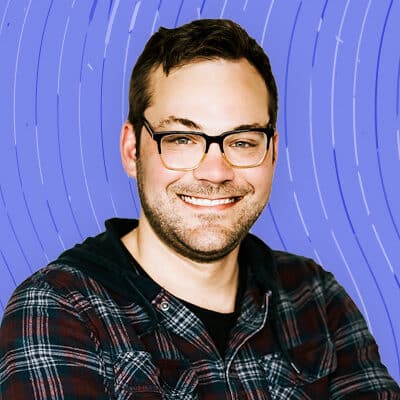
What Does A Software Engineer Do Day-to-Day?
Software engineers engage in a variety of tasks every day:
- Problem-solving: Much of an engineer’s time is spent solving complex problems. This involves a lot of planning, coding, and testing.
- Coding: Writing and reviewing code is a staple activity. This includes creating new applications, fixing bugs, and improving the functionality of existing software.
- Meetings and collaboration: Engineers often work in teams and must collaborate with other members, necessitating regular meetings to discuss progress, brainstorm solutions, and review code.
- Continuous learning: Technology is always evolving, and engineers must stay updated with the latest trends, languages, and methodologies.
📚 Related article: Read more about the daily operations of a KORTX engineer in How Our Engineering Team Balanced Daily Operations While Launching a New Product.
How to Become a Software Engineer: Software Engineer Career Paths
There’s no single path to becoming a software engineer. We all started as entry-level software engineers and worked up the ranks at various companies in different industries.
Let’s look at how we became software engineers
Javier’s Path, Software Engineer for 31+ Years
I distinctly remember the moment I fell in love with computers. I was eight when my dad brought home a computer from England called the Spectrum. He had done a bit of programming and wrote this program that put some dots on the screen in a circle. It hit me like a ton of bricks as sheer magic. That was some indeterminate number of decades ago.
I wanted to be a biologist for a while, but eventually, we moved on to bigger computers, and programming books magically appeared at home. I picked them up and read them obsessively and found a lot of stuff.
The first language that I learned was BASIC. It’s what came with the computer. There was this hint that you could also use machine language to do programming, and I did a bit of that. It was really a primitive machine, and I didn’t have a group of people who could teach me how to do that, so I kind of learned the basics of it but quickly moved on.
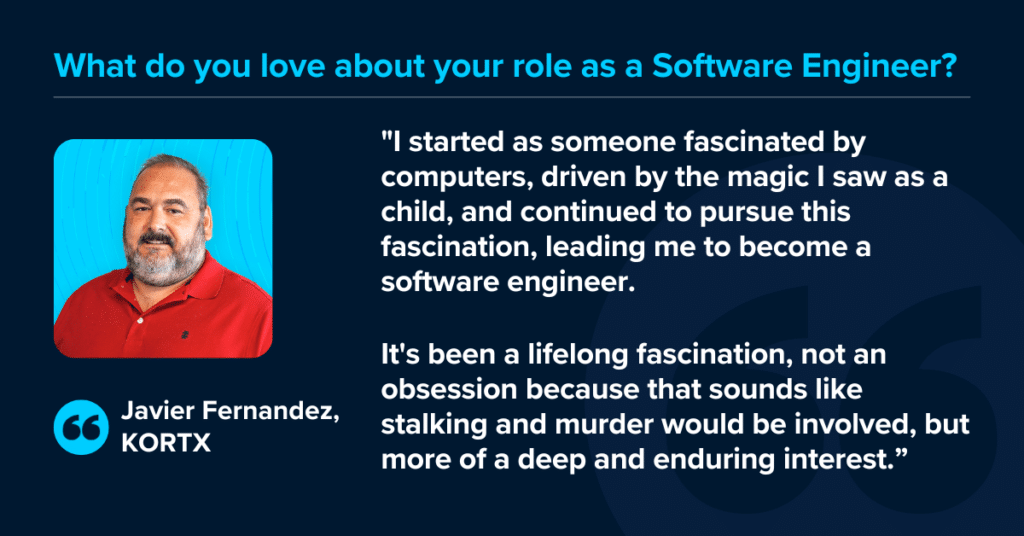
The programming book that appeared at home was the C programming language, which I consider the most important programming language ever. I then went to college for Computer Science at Michigan Tech, which meant going from sunny places to 12 years a month of snow and 10 months of winter. It was an adjustment.
I started as someone fascinated by computers, driven by the magic I saw as a child, and continued to pursue this fascination, leading me to become a software engineer. It’s been a lifelong fascination, not an obsession because that sounds like stalking and murder would be involved, but more of a deep and enduring interest.
Nathan’s Path, Software Engineer for 9 Years
I think I was a little older than Javier when I fell in love with computers and programming, but it was around middle school for me. My first experience with programming, which I didn’t know then, was with a video game called Warcraft III. It had a world edit custom map maker where you could make your own maps and do some custom scripting. I was awful at it. I’ve seen the code I wrote before, and it’s terrible. But I took a stab at different maps and stuff, which set me down the journey.
Later in high school, I had a statistics class I could have done better in because I was too busy wanting to program different programs on my TI-84. So, I was too busy with that instead of actual statistics.
From there, in my junior and senior high school years, I took an extra class where I learned a little bit of JavaScript. From there, I went on to take courses at Simpson College and fell into computer science as a whole.
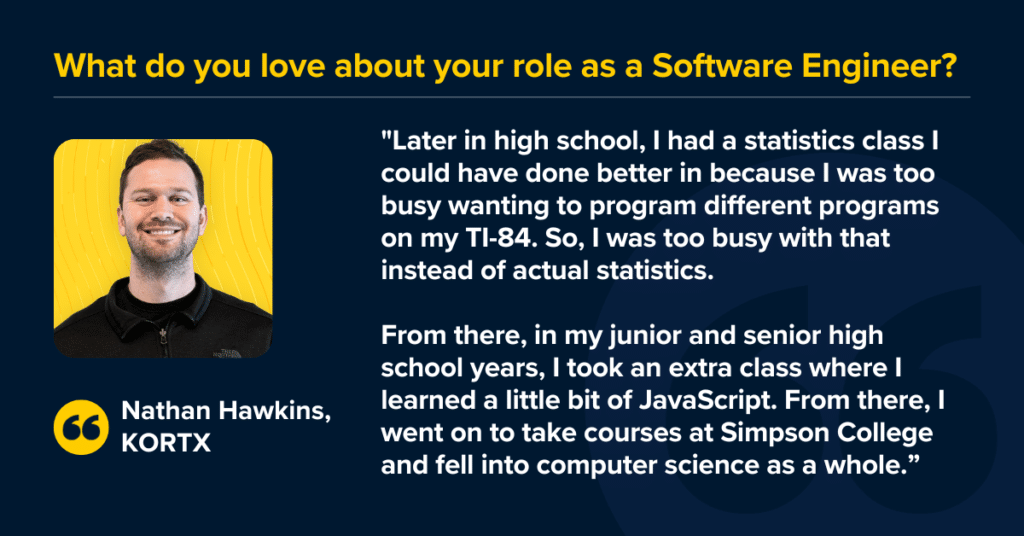
I started off as an Industrial Engineering Intern at Rockwell Collins, working my way up to Software Engineer II at Principal Financial Group, and now at KORTX as a Senior Software Engineer.
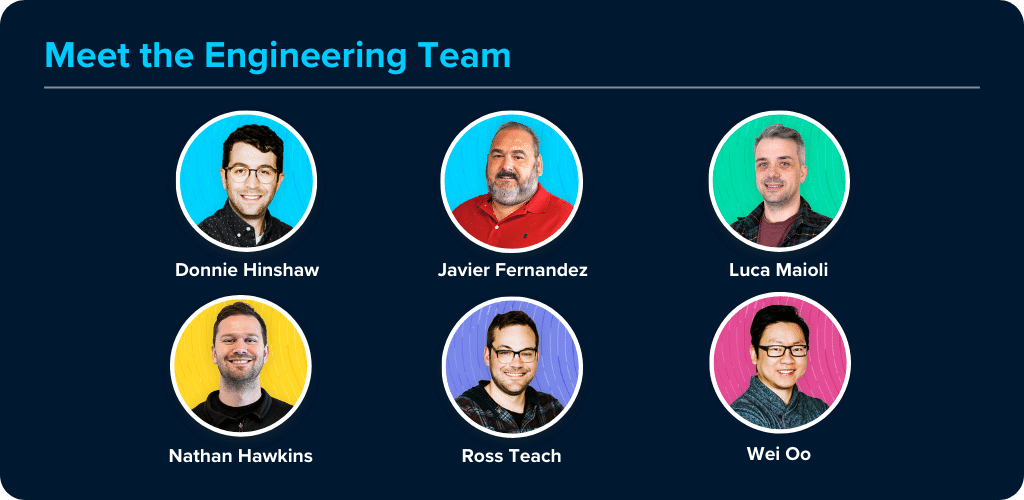
✨ Tips for Becoming a Software Engineer ✨
- Creative computing exploration: Start exploring what you can create with a computer. Feel free to experiment with different software or programming languages, even if they initially seem challenging.
- Embracing complex challenges: Embrace complex problems and view them as opportunities for growth. Engaging with challenges will sharpen your problem-solving skills.
- Continual learning and experimentation: Read books, take online courses, and experiment with new programming languages. Find your technology of interest and dive in.
- Practice and portfolio development: Write code often, try different challenges, and build projects that interest you to improve skills and build an impressive portfolio.
- Resilience in error handling: Don’t be discouraged by errors or bugs, use them as learning opportunities to improve your skills.
- Community engagement and collaboration: Engage with the programming community, join forums, attend meetups, or contribute to open-source projects for enhanced learning and networking.
- Understanding users and business: Grasp the business or audience you’re developing to tailor solutions to real-world problems.
- Mentorship and receptive to feedback: Find mentors and be open to feedback on your code for continuous improvement and growth.
Software engineering is filled with continuous learning and problem-solving. Stay passionate, curious, and engaged with the community around you.
What makes for a great software engineer?
“I think 3 things are essential to any software engineers working in a team:
1) a solid understanding of the fundamentals and solving tricky problems creatively, 2) the ability to communicate and collaborate within a team, and 3) a keen attention to little details. These are the secret weapons of any software engineer when developing a successful product.”

Become a Successful Software Engineer
Whether you’re inspired by creating magical experiences like Javier with his first computer or drawn to programming challenges like Nathan, there are many paths to becoming a successful software engineer.
Embrace the journey with an open mind, engage deeply with the community, and persist through the challenges.
Remember, every line of code written and every problem solved adds a verse to your career’s story.
Keep pushing the boundaries, and let your passion for technology drive you towards an exciting and fulfilling future in engineering.
At KORTX, we’re committed to you.
As a Great Place to Work-Certified™ company, we’re proud of our positive work culture that promotes collaboration, innovation, and growth for our team members.
If you’re interested in joining our team but need an opening that matches your interests and experience, apply to our Talent Pool today.
About the Authors
Javier Fernandez is a code monkey Principal Software Engineer at KORTX. He otherwise hoards tools and hobbies, especially if they require books (the hobbies, not the tools).
Nathan Hawkins is a Software Engineer at KORTX.
